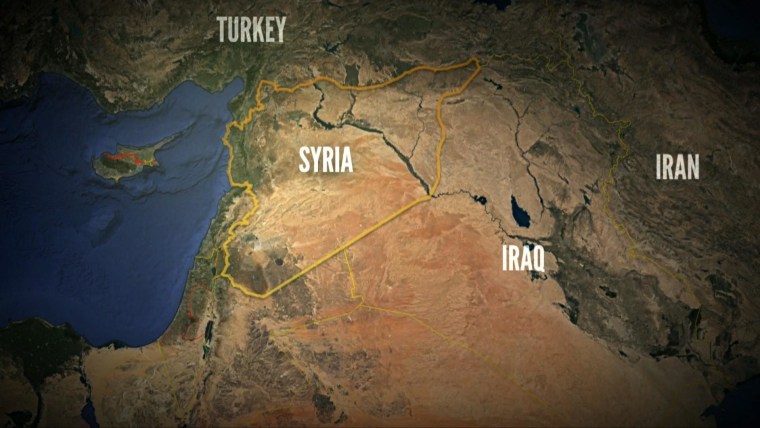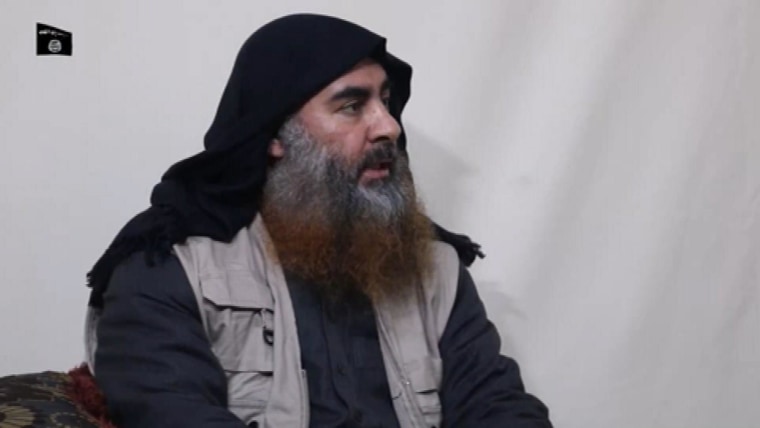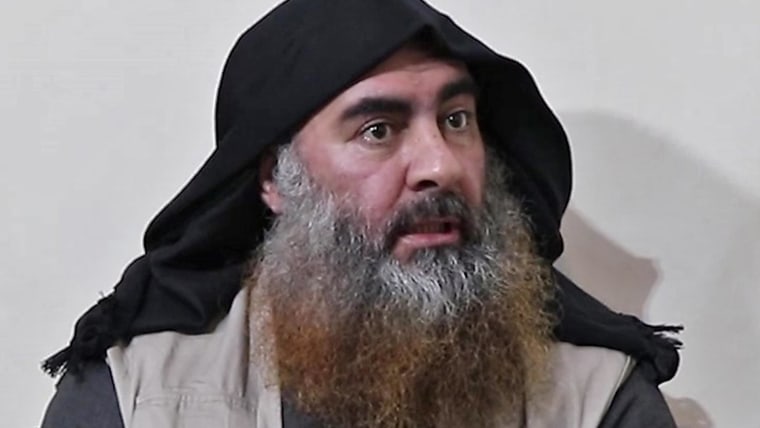Addressing the nation live from the White House, President Donald Trump on Sunday described in detail how the Islamic State group's leader Abu Bakr al-Baghdadi was killed in a U.S.-led raid.
"Last night, the United States brought the world's No. 1 terrorist leader to justice," Trump said, recounting how he and top national security officials had gathered in the White House situation room to watch what would be the most consequential military operation of his presidency so far.
But in the wake of the announcement and amid a flurry of details emerging from the raid, experts are warning that al-Baghdadi's death will not necessarily spell an end to the violent extremists trying to reconstitute their caliphate.
‘A hard blow to ISIS’
Al-Baghdadi's death is a hard blow for ISIS, particularly in the short and midterm, Fawaz Gerges, a professor at the London School of Economics and author of “ISIS: A History," told NBC News on Sunday.
“He provided overall guidance, motivation and inspiration not only to ISIS combatants, but also followers and supporters worldwide,” Gerges said.
The group al-Baghdadi helped build was infamous for its atrocities, including the genocide of the Yazidi minority, beheadings of hostages and attacks in numerous cities around the world. Under his leadership, ISIS in 2014 took over swaths of Iraq and Syria, imposing a reign of terror. It has been accused by the United Nations human rights office of killings, torture, rape and sexual slavery, forced religious conversions and the conscription of children.
His death will also deny ISIS their key leadership asset during a momentous period in the terrorist group's life, experts say, as its militants hope to capitalize on the power vacuum left in the region byU.S. troops departing northeast Syria.

"I am confident al-Baghdadi and his lieutenants have been busy preparing to exploit the U.S. exit and Turkey's incursion against the Kurds," Gerges said. "The killing of al-Baghdadi is a preemptive move that throws ISIS into the defensive and complicates its efforts to recover from the beating it has suffered in Iraq and Syria in the past two years."
For years, reports have circulated questioning whether al-Baghdadi was alive.
On Sunday, President Trump said al-Baghdadi killed himself and three of his children, detonating a suicide vest as U.S. forces closed in.
"He was a sick and depraved man. And now he is gone," he said.
ISIS has yet to comment on the announcement of al-Baghdadi's death.
Who was al-Baghdadi?
Al-Baghdadi — who operated under a nom de guerre — had led ISIS since 2010, but until April he had not been seen for five years.
Little is known about the Iraqi extremist who went from being held in a U.S. detention camp in the wake of the 2003 invasion to the top of the jihadist universe with barely a whisper of a backstory.
Jihadist propaganda has painted him as an imam from a religious family descended from noble tribes, and a scholar and a poet with a Ph.D. from Baghdad's Islamic University, possibly in Arabic.
Baghdadi joined Iraq's insurgency in 2003. He was captured by the Americans, but not considered much of a threat, he was released about a year later.
It was not until July 2014 that he seized the world’s attention, climbing the pulpit of Mosul’s medieval al-Nuri mosque in black clerical garb to declare an Islamic caliphate.
The U.S. and its allies have been searching for al-Baghdadi for years, with a $25-million bounty on his head.
But as ISIS lost most of its territory in recent years, al-Baghdadi became a fugitive.
He used a host of aliases and was said to wear a bandanna around his face to conceal his identity from everyone except a very tight inner circle.
Trump said Sunday the ISIS leader “constantly changed his mind” and moved around, making his capture difficult.
Most of his messages were distributed as audio recordings, which helped him evade surveillance and detection — until the U.S. raid that claimed his life.
Although it will take ISIS a while to regain its equilibrium after al-Baghdadi's death, Gerges said he was more of a symbolic leader than an actual one in charge of day-to-day operations.
"The group will select a leader sooner rather than later. It has had contingency plans for this eventuality," he added.
'Still resilient'
Even with al-Baghdadi out of the picture, experts agree it would be premature to pen an obituary for ISIS.

“Just like the killing of Osama bin Laden did not end al Qaeda, the killing of Baghdadi will not end ISIS,” said Lina Khatib, the head of Middle East and North Africa program at Chatham House, a London-based think tank.
“If anything, ISIS is likely to use his death to rally its followers in the name of revenge,” she added.
U.S.-backed fighters in Syria declared victory over ISIS in March, and amid Turkey's invasion into northeast Syria earlier this month, Trump tweeted that the U.S. had defeated "100% of the ISIS Caliphate."
But in its most recent quarterly annual report on U.S. operations in Syria, released in August, the Defense Department's inspector general said that "ISIS remains a threat in Iraq and Syria."
Former Defense Secretary James Mattis has also warned that the president's decision to pull troops from Syria's border in advance of a Turkish incursion could lead to ISIS's resurgence.
'New phase' for ISIS
Karin Von Hippel, director-general of the Royal United Services Institute for Defense and Security Studies, a think tank in London, said al-Baghdadi's death is likely to usher in “a new phase” for ISIS, with the expectation that a new leader will emerge in the coming weeks.
It might also provide the opportunity for a rapprochement between al Qaeda and ISIS, which split in 2014, Von Hippel added.
“Both have been weakened to a degree on the battlefield, especially ISIS after losing its so-called Caliphate earlier this year. But both have considerable skills sets, notably in the virtual and physical worlds, in grooming and recruiting, training, bomb making and directing attacks,” she said.


